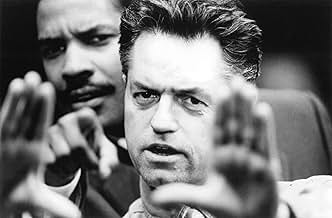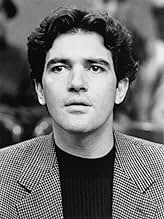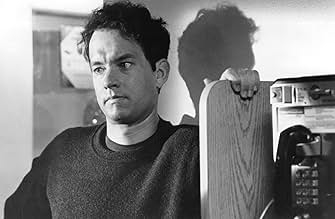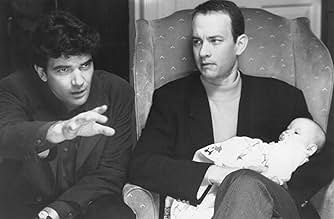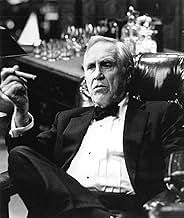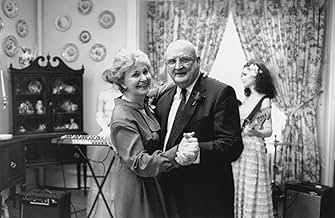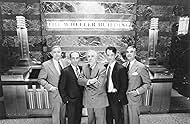Um homem com AIDS é demitido do escritório de advocacia, onde ele trabalha por causa de sua doença. Para reivindicar sua demissão injusta, contrate um advogado homofóbico que seja o único qu... Ler tudoUm homem com AIDS é demitido do escritório de advocacia, onde ele trabalha por causa de sua doença. Para reivindicar sua demissão injusta, contrate um advogado homofóbico que seja o único que aceita o caso.Um homem com AIDS é demitido do escritório de advocacia, onde ele trabalha por causa de sua doença. Para reivindicar sua demissão injusta, contrate um advogado homofóbico que seja o único que aceita o caso.
- Ganhou 2 Oscars
- 20 vitórias e 23 indicações no total
- Rachel Smilow
- (as Stephanie Roth)
Enredo
Você sabia?
- CuriosidadesThe moment when Mary Steenburgen's character says that she hates the case was improvised in the moment, when the actress expressed her hate towards her role after shooting the mirror scene and Jonathan Demme encouraged her to incorporate it into the role, so the woman would seem more human.
- Erros de gravaçãoThe court stenographer doesn't seem to be actually typing, and the paper tape recording her keystrokes doesn't ever advance.
- Citações
Joe Miller: Have you ever felt discriminated against at Wyatt Wheeler?
Anthea Burton: Well, yes.
Joe Miller: In what way?
Anthea Burton: Well, Mr. Wheeler's secretary, Lydia, said that Mr. Wheeler had a problem with my earrings.
Joe Miller: Really?
Anthea Burton: Apparently Mr. Wheeler felt that they were too..."Ethnic" is the word she used. And she told me that he said that he would like it if I wore something a little less garish, a little smaller, and more "American."
Joe Miller: What'd you say?
Anthea Burton: I said my earrings are American. They're African-American.
- Cenas durante ou pós-créditos"This motion picture was inspired in part by Geoffrey Bowers' AIDS discrimination lawsuit, the courage and love of the Angius family and the struggles of the many others who, along with their loved ones, have experienced discrimination because of AIDS."
- Versões alternativasThe cable and network television versions of Philadelphia edit out portions of the pharmacy scene where a gay University of Pennsylvania law student attempts to pick up Joe Miller. These two versions end this scene with the law student responding "Do I?" to Joe Miller's question concerning whether Miller looked gay. In the theatrical, home video and premium channel versions, Joe Miller continues to berate the law student with bigot remarks regarding homosexuals.
- ConexõesEdited into Die Geschichte des erotischen Films (2004)
- Trilhas sonorasStreets Of Philadelphia
Produced by Bruce Springsteen and Chuck Plotkin
Written and Performed by Bruce Springsteen
Courtesy of Columbia Records
AIDS is a reality and homophobia is a nasty truth that permeates our "United" States of America, as well as the rest of the world. At the time that this film was released (about 1993), the U.S. found solace in the idea that AIDS and homosexuality were dirty brothers in a distant family. By placing the film in the "City of Brotherly Love", hiring Bruce Springsteen to sing the title song and having an up-and-coming Tom Hanks star, director Jonathan Demme wisely readied an ignorant America for our first, uninhibited glance into the face of AIDS.
Tom Hanks embodied his role in an Oscar-worthy performance, allowing us to watch as his lovely and lively Andrew Beckett deteriorate before our eyes. Tom Hanks and the writers took to task the difficult and annoyingly controversial hurdle of playing the "gay" character and placing the "straight" audience into that different world. Stereotypes are mostly shied away from in the script with a few "fem" gays and drag queens. These scenes are few, but are also a reality. Many a Christmas party have I attended with the same crowd ("fems" and drag queens) in the mix. The other, mildly annoying, factor in this film is that the writers inform us that squeaky-clean gay Andrew Beckett contracts AIDS at a porn theater from an anonymous stranger, while in a committed relationship. This annoyed me because I wanted a righteous victim, not a impure victim. Yet as time has gone by and I have had the opportunity to work with many a victim of AIDS, whether be it male or female, gay or straight, I have seen that this too is an unfortunate reality. No one is perfect (gay or straight, male or female) and mistakes are often made. Costly mistakes are often made. This was a painful truth, but it is a truth nonetheless. In this, Tom Hanks as Mr. Beckett, brilliantly gave AIDS an honest face for a distant America.
Denzel Washington, on the other hand, allowed America to have a relatable character, one whose shoes we've fit in before. Denzel's views of homosexuality were (and still are) commonplace in the American psyche and his reactions to AIDS were understandable to the average audience. Yet all in all this dramatic film brought a message home.
Demme's directing style is nothing amazing; he tastefully weaves a tale without flashy shots or fancy cuts. At times the film borders on preachy, but, as always, it is Demme's story that grasps the audience, his mood that sets us into the tale, his actors and his direction of them that gives the film honesty. This film is highly recommended if not for the great acting but for lovers of a great story.
- pjaldo1
- 5 de set. de 2004
- Link permanente
Principais escolhas
Detalhes
- Data de lançamento
- País de origem
- Idioma
- Também conhecido como
- Philadelphia
- Locações de filme
- Empresas de produção
- Consulte mais créditos da empresa na IMDbPro
Bilheteria
- Orçamento
- US$ 26.000.000 (estimativa)
- Faturamento bruto nos EUA e Canadá
- US$ 77.446.440
- Fim de semana de estreia nos EUA e Canadá
- US$ 143.433
- 26 de dez. de 1993
- Faturamento bruto mundial
- US$ 206.678.440
- Tempo de duração2 horas 5 minutos
- Cor
- Mixagem de som
- Proporção
- 1.85 : 1
Contribua para esta página







